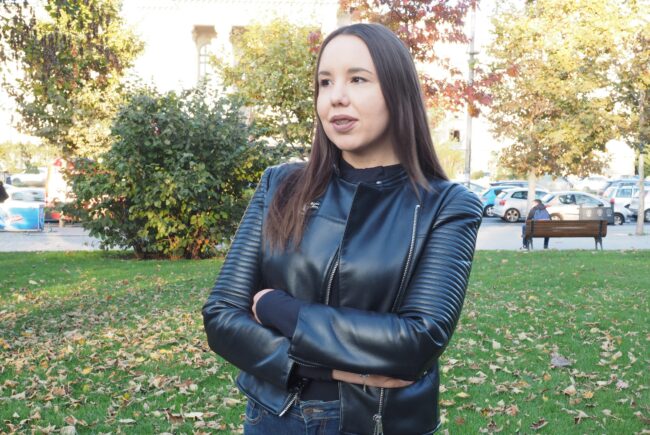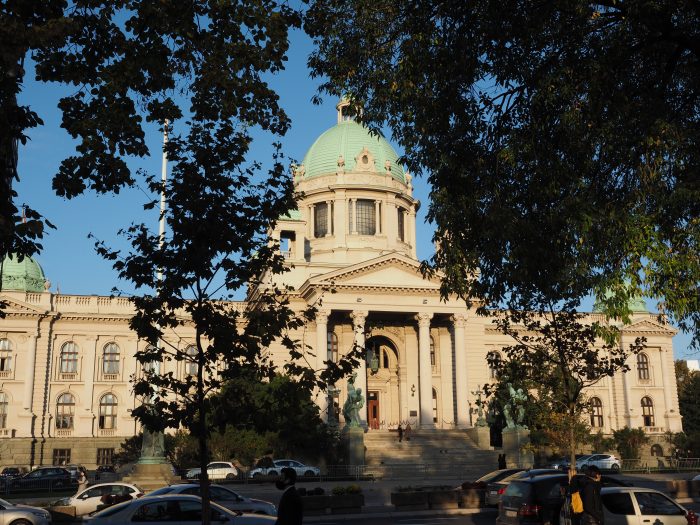

“Our work is very challenging, given that civic education is not recognised as particularly important by the relevant institutions,” Ksenija Nikić says.
“Our work is very challenging, given that civic education is not recognised as particularly important by the relevant institutions,” Ksenija Nikić says.
Ksenija Nikić talks about tensions with state authorities, fighting GONGO organisations and the other challenges she faces in her job at Civic Initiatives.
Gradanska Inicijative (Civic Initiatives) is Serbian non-governmental organisation that is over 20 years old. Its office is right in the middle of Belgrade, the capital of Serbia.
The organisation focuses on strengthening the capacity of civil society organisations and informal groups. It also works directly with individual teachers, media workers and community leaders, supporting them in creating impactful civic education in schools and elsewhere in Serbian society.
Ksenija Nikić works for Gradanska Inicijative (GI) as the Coordinator of Civil Society Development and Citizen Participation Programme. She initially started her work in the organisation as a volunteer.
Nikić admits that it is not easy to work with democratic education and development in a country where democracy is seriously wobbling.
Freedom House, the non-governmental organisation conducting research on democracy, political rights and civil liberties around the world has described Serbia as a “hybrid regime’ rather than democracy because of declining standards in governance, justice, elections and media freedom.
Civil society should be the controller and partner of the state.
Only about 50 percent of voters in Serbia actually voted in the parliamentary election in summer 2020, and an otherwise fragmented opposition boycotted the election. Media in the country is strongly pro-government with few exceptions, and it is difficult for the opposition to get its voice heard. There is also an obvious lack of trust between the state and the people.
“Our work is very challenging, given that civic education is not recognised as particularly important by the relevant institutions. It is the only subject in schools where students learn about important topics such as human rights and democracy, but it is optional and doesn’t affect the final average of students, so they don’t put much effort into it,” Nikić explains.
To add to the challenges, teachers do not have enough literature and materials to carry out quality teaching, and often they are also insufficiently skilled, since there is no initial education for teachers of civic education at faculties, Nikić explains.
NGOs teaching these skills are not favoured by the Serbian authorities.
“It is not easy to work in an environment where civil society organisations are often characterised as foreign mercenaries and traitors, especially when such accusations come from the ruling elite.”
Tensions between the state and NGOs
Nikić says that the relevant governmental institutions are not very keen to make real progress when it comes to developing civil society and democracy.
“Civil society should be the controller and partner of the state,” she says.
In practice, however, the dialogue between the state and civil society is often illusory, and only serves to give the impression of participation and transparency for the public and the EU. Therefore, civil society must be careful not to become a puppet of the state and lose the trust of citizens, Nikić argues.
“When it comes to the development of democracy, I think the important role of civil society is to inform and educate citizens and to create an environment in which citizens will have a greater opportunity to influence decision-makers. Our goal is to build a stronger, more efficient and potentially more sustainable civil sector.”
Recently, a new peculiar threat to the work has emerged: the so-called GONGO organisations.
According to Nikić, these organisations are founded by individuals close to the authorities, usually for two reasons: to simulate support for the authorities and their initiatives, and to participate in public tendering to extract money from the budget of the state or local autonomous bodies.

Gradanska Inicijative is situated right in the middle of Belgrade, close to the Serbian Parliament Building.
This creates additional problems for the work of civil society organisations, as GONGO organisations try to discredit independent CSOs with many years of experience. This phenomenon poses a major threat to the rule of law, says Nikić.
Nikić emphasises that all kind of real NGOs may ask for help from Gradanska Inicijative for training.
“We organise trainings for all formal and informal associations. Every association, regardless of the topic they deal with, needs training in areas such as strategic planning, advocacy and communication. Of course, it is important for them not to be GONGO or similar associations that do not share the values we are guided by.”
Adult education strengthens civil society
Gradanska Incijative’s work entails tackling tough challenges, but sometimes it is successful.
Nikić shares what she thinks are best ways to strengthen civil society by education: education through the provision and exchange of information, capacity building, networking support, provision of resources, mentoring support, and regular open doors on topics that organisations want to hear and learn about.
“Overall, we are striving to strengthen civil society through education, the promotion of democracy and support for active citizenship.”
One concrete example of this is a recent training GI organised for teachers on the technique of deliberation in teaching.
“I thought how great it would be if all citizens participated in this training, because it seems to me that this kind of education is much needed by adults, but this is not recognised enough. I think that non-formal education has a key role to play in this. Adult education as “lifelong learning” has the mission of strengthening civic awareness,” Nikić says.
Kirjoittaja







